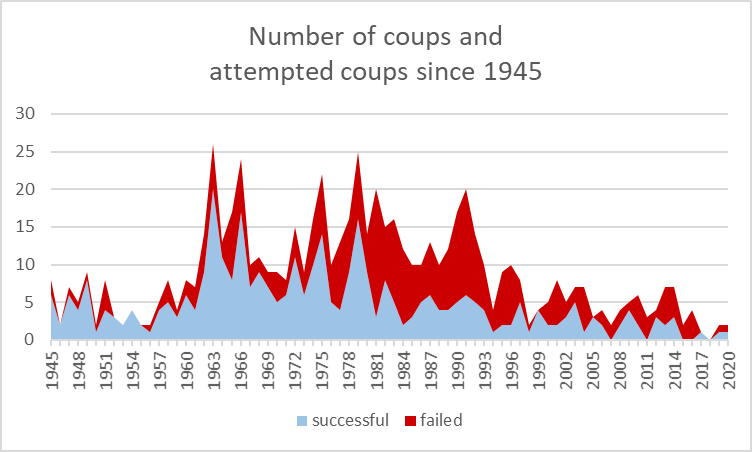From a statistical perspective: Why the march to the Capitol was not a good idea for staying in power
How much Donald Trump really influenced the events on January 6th needs to be assessed later on by historians. Nevertheless, from an empirical point of view a few things can already be said today: Coups are an extremely rarely observable phenomenon for modern democracies, seem to have generally gone out of fashion and are almost never successful in democracies.
The MBI CONIAS conflict database separately records coups and attempted coups since 1945: A total of 668 coups and attempted coups can be recorded at the country level between 1945 and 2020.

As illustrated in the figure above, the highest number of coups occurred in the period from 1962 to 1982 and then again around 1990. Both peaks can be explained by the number of young states and thus untested power and security structures during the period of decolonization or the collapse of the Soviet Union and the end of the Cold War. Overall, a loss of significance of coups can be observed, showing for example in 2018 – a year with not a single coup or coup attempt.
The declining use of this instrument to change power (only rarely used to maintain power) can be explained, among other things, by its significantly reduced success rate.
While in the period between 1950 and 1980 more than two-thirds (69%) were considered successful, meaning they led to a change of power, the measurable outcome in the following years tips exactly into the opposite direction. Between 1981 and the 1990s only one-third (34%) of all coup plotters achieved their goal with the rest failing. From the mid-1990s onward, the number of coups measured annually declined sharply. For the last ten years, the vast majority of all coups (62%) failed.
Coups are particularly unsuccessful in fully established democracies like the U.S. has been for many years. The most famous of these unsuccessful coups took place when then-King Juan Carlos opposed the military and sided with democracy in the 1982 military coup in Spain.
If you want to learn more about coups, their chances of success, and the subsequent risks, please contact our Sales team.
Political instability poses an immediate and highly complex set of risks to business interests. The MBI CONIAS Risk Intelligence analysis tool assesses the political risk situation. MBI’s up-to-date data support companies in identifying risks for location, logistics and investment security at an early stage and in developing targeted adaptation strategies.


